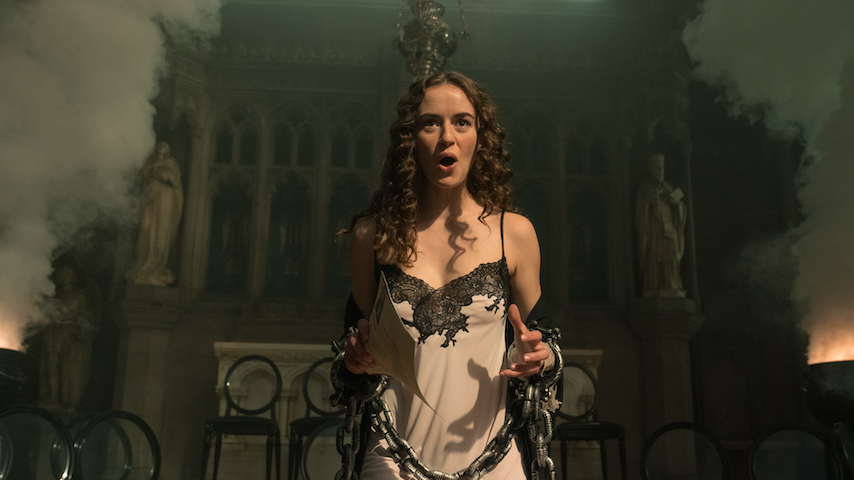One of the most grating things about the Emmys is its unwillingness to change. While each year the Oscars see plenty of new films nominated and awarded, the Television Academy continues to nominate the same series each year to the detriment of dedicated television viewers and critics alike. There are always new shows that deserve a spot, but getting Emmy voters to explore them is akin to pulling teeth. And there are few genres more overlooked by the Television Academy than horror.
With both The Substance and Nosferatu nabbing Academy Award nominations this year, it seemed like a turning point was on the horizon for the genre, suggesting that voters were finally ready to acknowledge its artistic merits. Instead, it unfortunately became clear that while that may be the case for cinema, television has decided to stay stagnant. Despite critical acclaim, series like Evil and Dark Winds didn’t get a single nomination (the latter is more of a drama with horror and supernatural elements, but still), while Interview With The Vampire only received two below-the-lines nods. (The A.V. Club just ran a piece on why IWTV’s makeup deserves a win.) This disparity highlights a troubling trend: While those in the film industry are starting to embrace horror as a legitimate genre worthy of recognition, folks in television aren’t yet.
Interestingly, in recent years, the Emmys have begun celebrating science fiction. Shows like the spectacular Andor, Paradise, and Severance (again, there are sci-fi elements even if it doesn’t fully fall under the umbrella of that genre) were some of 2025’s Emmy darlings, earning numerous nominations in big categories. This growing recognition marks a shift for a genre previously overshadowed by traditional dramas.
Interview With The Vampire and Dark Winds both boldly challenge their viewers, inviting them into a world where morality is elusive and the horrors faced by the characters are relentless. There are no clear-cut answers in either, and there’s a willingness to explore flawed and downright awful people within these narratives in interesting ways. In both of these shows, their protagonists are forced to reckon with their pasts, which are dredged up in elongated memories and carefully crafted dream sequences. This exploration of flawed characters is also present in Evil, where viewers are not provided with easy answers—or any answers at all.
In Vampire and Winds, lead actors Jacob Anderson and Zahn McClarnon bring to life characters burdened by memories of childhood trauma, as well as, respectively, racism carried from 1910s New Orleans to post-WWII Paris and the death of a child. These two shows refuse to stray away from the horrific pasts of these leading men, instead forcing their audiences to reckon with the struggles of Louis and Joe. Unlike other shows that use shocking plot twists to elicit cheap gasps, like the tedious finale of The White Lotus season three, these stories are anchored by characters who have long met their ends and whose unresolved fates resonate in the present.
These series feature powerful explorations of how history shapes identity and relationships. The haunting memories that seep into every moment remind viewers that our pasts are not easily escaped but are woven into the very fabric of who we are. Ultimately, Anderson and McClarnon’s characters challenge us to reckon with the lasting effects of trauma as they unfold these raw, unflinching narratives. Louis and Joe are frustrating, as they seem reluctant to uncover the most painful parts of their lives. But as they’re forced to chip away at their carefully constructed facades, each one sheds light on truth, shame, and grief.
That said, two series that are entrenched in horror did get nominated for significant awards this year, though there is a case to be made that each toes the line between embracing that genre and being afraid of it. The Last Of Us has always diverged from the roots of its horror-based video game, trading encounters with terrifying zombies for monologues that feel as if they exist in a bland drama. And the mockumentary What We Do In The Shadows, while certainly bloody, found success not in scares but in laughs.
This year alone, Severance and The White Lotus garnered more than 20 nominations each, while The Pitt (an admittedly strong show) and The Last Of Us garnered more than 10. There is clearly enough room for more variety, but because voters are adamant on running the Emmys like a popularity contest, we’re left with the same series taking up space that horror television shows could use, if only to put them on more viewers’ radars. By snubbing Interview With The Vampire, Dark Winds, and Evil—which lean into the horror genre’s fundamentals while spreading out into other tonal waters—for the big prizes, the Emmys may even be doing viewers a disservice, as the industry could use more exciting genre shows like these. And that’s scary.

 Keep scrolling for more great stories.
Keep scrolling for more great stories.
